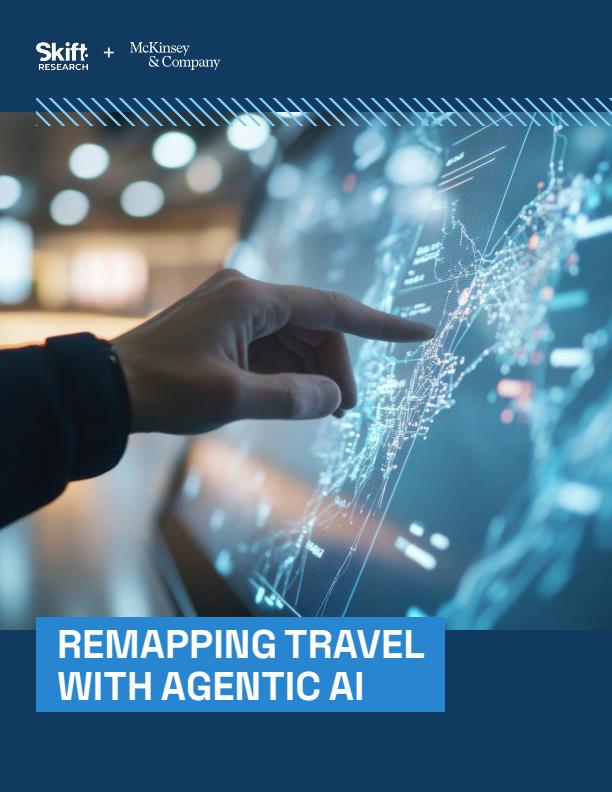The travel industry has been no stranger to tech upheaval. Tectonic shifts over the past several decades have changed the ways that we plan, book, and experience our journeys—while also disrupting the companies that help bring those journeys to life.
Agentic AI is the buzziest new tech tool on the scene, and it offers thrilling capabilities. While gen AI mostly functions as an adviser by providing well-informed counsel, agentic AI can function more as a direct report by accomplishing tasks. It has the agency to make decisions and then autonomously act on them. It can identify problems, find fixes, and apply solutions all on its own. It’s smart and tireless, a self-starter and go-getter, requiring only limited human oversight. Perhaps most important: Agentic AI can serve as an interface that could help companies harness the full power of AI.
Given the tremendous potential of agentic AI, travel and hospitality companies are beginning to experiment with it. But to realize the technology’s full impact, organizations will need to create new AI strategies, governance, and infrastructure—altering core business processes and ways of working. Companies will have to shift from scattered pilots to enterprise-scale transformations architected by cross-functional teams and championed by deeply engaged C-suite leaders.
What does the travel industry need to know as it ponders going all in on agentic AI? How suited is this technology to the unique dynamics of the travel sector? Which consumer- and non-consumer-facing use cases could offer travel and hospitality players the most ROI in the near term and over the long haul? How can organizations integrate agentic AI in ways that will allow it to deliver maximum benefit to companies, workers, and consumers?
A new report, Remapping travel with agentic AI—a collaboration between McKinsey and Skift—examines the potential for agentic AI to unleash the full value of AI in travel. Based on analysis incorporating surveys of 1,002 travelers and 86 travel executives, the report traces the digital prologue that brought the industry to this moment, details agentic AI’s transformative capabilities for both travelers and travel companies, and provides a blueprint for travel and hospitality leaders who are eager to accelerate their organizations’ agentic AI initiatives.
AI’s growing but not fully realized role in travel
AI has seen accelerating adoption in the travel industry. Only about 4 percent of companies in the Skift Travel 200 (a subset of the largest publicly traded travel companies in the world) mentioned some form of AI in their 2022 annual reports. By 2024, that had risen to 35 percent.
Meanwhile, AI-based travel start-ups are attracting a surge of venture capital interest. In 2023, according to Skift tracking, only about 10 percent of travel-industry-related venture capital funding went to travel start-ups that provided AI-enabled offerings. By the first half of 2025, that figure was 45 percent.
Some travel and hospitality companies seem excited about the opportunities that AI is presenting. In a survey of 86 mostly US-based travel executives conducted for this report, 26 percent of respondents say that introducing AI to their organizations has led to cost reductions in operations, 30 percent say that it’s aiding faster decision-making, 33 percent say that it’s improving customer personalization, 36 percent say that it’s enabling higher-quality outputs, and 59 percent say that it’s increasing employee productivity. A majority of respondents indicate that adopting AI in their organizations has resulted, over the past three years, in more than 6 percent annual revenue growth and more than 6 percent annual cost savings. (It’s important to distinguish the broader definition of the term “AI” and the capabilities that it encompasses from the narrower definition implied by the term “gen AI.”)
Challenges that hinder AI’s deployment in travel
Despite all this burgeoning enthusiasm and adoption, however, the travel and hospitality sectors still appear to lag behind others in terms of AI maturity. Travel companies’ AI-based efforts have largely centered on creating enterprise-wide copilots and chatbots, and such efforts have scaled quickly. But for the most part, these more horizontal initiatives have delivered diffuse, hard-to-measure gains. Vertical use cases that are function specific to the travel sector could be more transformative, but the vast majority of these more focused experiments have remained stuck in pilot mode.
Why has the travel industry faced challenges as it attempts to dive deeper into AI? Two possibilities emerge as central stumbling blocks:
- Siloed data and incompatible systems make using AI more difficult. The travel industry (and especially hospitality) is highly fragmented, cobbled together in part from countless small to medium-size businesses spread across nearly every country. The lack of centralized data ownership across the travel ecosystem limits the network effects and feedback loops that typically accelerate AI performance. As a result, it can be exceptionally challenging for travel companies to train effective AI models or to deliver personalized, real-time, AI-powered experiences at scale.
- Travel companies tend to favor investment in human interconnection instead of tech innovation. Some of the travel sector’s wariness regarding AI might be attributed to the industry’s general view that it specializes in service, not technology. New tech capabilities are often seen as enablers but not as core business components. As a result, tech talent and tech investment can lag behind.
Agentic: The next chapter in AI’s evolution
In just the time since the publication of the 2023 McKinsey and Skift report on AI in travel, there have been some remarkable AI innovations. Perhaps chief among these is the advent of agentic AI, a cutting-edge technology poised to revolutionize the travel industry. A few features distinguish agentic AI from previous forms of AI (including gen AI):
- Agentic AI can autonomously make decisions and take the initiative to accomplish goals, using multistep reasoning while undertaking complex actions.
- To execute tasks, agentic AI can call on external tools, APIs, and systems.
- Agentic AI can store and recall long-term, structured memories that track context, progress, and user preferences, allowing it to deeply personalize its responses and to handle requests spread across multiple sessions.
While gen AI has mostly played a reactive, advisory role—answering research questions and offering helpful suggestions when specifically prompted to do so—agentic AI takes a far more proactive posture. An AI agent can carry out a complicated task end to end and can even direct teams of other AI agents to work together on the project. Agentic can monitor a situation, understand on its own when intervention is necessary, and then develop a responsive plan and enact it with little human involvement. It can also remember who someone is and what they’ve needed in the past and then incorporate that understanding into the present.
The agentic-AI-powered future of customer experience in travel
As customers have developed greater familiarity with AI-based tools, their trust in those tools has increased. More than 90 percent of customers report some confidence in the accuracy of travel information that they receive through AI. It’s worth noting, however, that consumers tend to express more comfort with using currently available AI tools to brainstorm in open-ended ways (such as finding inspiration or destination ideas) than with using these tools in more high-stakes situations (such as understanding visa requirements and resolving customer service issues).
This wariness is understandable, especially given the pervasive reports of hallucinations occurring in gen AI output. Only 2 percent of respondents in Skift’s State of Travel 2025 report say that they’re currently willing to give an AI tool full autonomy to “take the wheel”—to make and modify travel bookings without human oversight. Travel companies will need to work to build consumer trust in tech capabilities.
This is a place where agentic AI could potentially make a meaningful difference. It can detangle the more specific, thornier issues that gen AI is unable to handle. And the technology could go a step further by resolving issues on its own instead of merely suggesting solutions.
How agentic AI can improve travel’s internal workflows
A McKinsey report on the economic potential of gen AI found that its top use cases in terms of financial impact on companies were in marketing, sales, customer service, and internal software engineering. Investing in internal use cases can have multiple benefits. For instance, risk reduction: When mistakes occur in the early application of a new technology, they’re far less costly if confined to internal use cases. Also, building muscle memory: Piloting technologies in internal workflows can help develop organizational familiarity and technical readiness that accelerates the rollout of future customer-facing innovations.
Agentic AI’s value for frontline travel workers
Frontline workers often spend considerable time on repetitive, manual tasks. Agentic AI could, for instance, automate the airline rebooking process during travel disruptions and handle routine tasks, such as processing refunds and issuing vouchers. This could free frontline employees to focus more on empathetic, human-to-human customer interactions.
Agentic AI’s potential to transform hotel operations
Hotel operations and property management involve a large volume of quick, on-the-go decisions. Letting agentic AI make some of those decisions could lead to significant efficiency improvements:
- Automated guest room allocation: By connecting to a customer data platform, agentic AI could automatically execute room assigning in ways that incorporate guests’ preferences, loyalty tiers, and feedback from past stays. This can improve the guest experience while also reducing work for employees.
- Predictive maintenance: Agentic AI could anticipate when elements of the hotel property will need attention. It could plan repairs based on input from smart sensors, maintenance and housekeeping logs, and guest feedback.
- Housekeeping task management: Using information such as staffing levels, guest schedules, and computer vision analysis of rooms after guest departures, agentic AI could dynamically identify and assign housekeeping tasks in ways that optimize workflows, minimize delays, and ensure that rooms are cleaned efficiently and on time.
- Menu engineering: Agentic systems could autonomously analyze and optimize food and beverage menu offerings and prices based on demand, ordering trends, and profitability and automatically procure needed inventory ahead of time.
Using agentic AI in airline pricing and revenue management
There are many opportunities for agentic AI to provide value in airline offer management. Agentic’s ability to analyze shifting information and execute tasks could combine to improve the way that offers are crafted:
- Dynamic bundling: Agentic AI could create personalized bundles that are tailored to passenger preferences. This can help ensure that offerings are relevant to customer needs, boost conversion rates, and maximize the value captured from ancillaries, such as checked bags and extra legroom.
- Real-time pricing: Using up-to-the-moment information and indicators (such as search trends, weather conditions, and third-party data), agentic AI could dynamically adjust pricing to align with real-time market conditions and demand forecasts.
- Load factor optimization: Airlines purposefully overbook seats to achieve maximum load factors (in other words, seats filled) on aircraft. Agentic AI could automate and fine-tune overbooking calculations by analyzing past booking patterns, no-show rates, and various other external inputs.
- Loyalty reward personalization: Agentic AI could help create tailored loyalty rewards and proactively send them to program members. This could enhance customer engagement, improve customer retention rates, and increase the lifetime value of a given customer.
Launching and accelerating agentic AI adoption
Of the travel executives we surveyed, 90 percent say that their organizations currently use gen AI in some capacity, but 38 percent say that they’re not using agentic AI at all. And while 22 percent say that gen AI use is widespread across their organizations, only 2 percent say the same of agentic AI. Insights and lessons learned from tech adoption efforts across various industries can provide a valuable road map for travel companies that hope to initiate or accelerate their own adoption of agentic AI.
Prepare your technology foundations
Travel organizations can begin by examining their baseline tech conditions. Building out agentic system capabilities will require foundations such as a scalable cloud infrastructure, strong data readiness, and previous implementation of more conventional forms of AI. Future possibilities are exciting, but it’s only when solid infrastructure is in place that agentic AI can thrive.
Some companies have discovered an interesting approach to remediating their tech foundations that might be described as “tech, heal thyself.” In these cases, agentic AI is deployed to orchestrate autonomous squads of specialized AI agents that can assess, update, and build complex tech infrastructures on their own. Agents within each squad automate tasks such as reverse engineering code and performing quality assurance.
Chart a digital road map for integrating agentic AI
Our survey of travel executives reveals that their most cited challenge regarding AI adoption is a lack of technical expertise and talent. But their second-most-cited challenge is a lack of a clear road map for business domain transformations. Technology doesn’t work in isolation from the organization’s broader functionality. Among the most critical prerequisites for any company seeking to adopt advanced technologies, such as agentic AI, is the creation of a digital road map backed by senior leadership and tied to business outcomes.
Upskill employees to provide needed capabilities
Introducing new technologies into the core of a business can fundamentally change the skills that employees will need on a day-to-day basis. Organizations should direct resources to upskill those workers and make them feel comfortable with the new tech. McKinsey analysis has found that the top barrier to implementing growth strategies, especially those related to digitalization, is talent.
A primary note of caution for organizations is to be cognizant of the potential for AI fatigue—employees feeling overwhelmed by ubiquitous and ambiguous directives to incorporate AI into their workflows. To address and prevent further AI fatigue, organizations should avoid pushing the broad use of AI without clear and direct purpose, focusing instead on a few high-value tools that employees will actually use.
Foster a quick-moving, flexible corporate culture
The pace of agentic AI’s advancement is rapidly accelerating. Ignoring fast-moving developments in this space could easily lead to a competitive disadvantage. To avoid this, companies need to foster cultures of flexibility, experimentation, and adaptability. They should stay constantly informed about new tools and platforms entering the market, conduct regular build-versus-buy assessments, and maintain a willingness to pause or pivot from projects when necessary.
Redesign end-to-end business processes
A McKinsey survey of executives who’ve launched digital transformations found that more than 70 percent said that their organizations’ transformations lost momentum during adoption and scaling. This is the danger for companies beginning agentic AI journeys. Simply integrating a new AI use case into existing processes or workflows isn’t enough to realize value and remain competitive and relevant. Successful adoption and scaling of agentic AI will require rethinking and redesigning underlying business processes so that the organization can sustain new ways of working.
Technologies such as agentic AI don’t reimagine the why of travel. They reimagine the how. They can reduce friction across the journey, make personalization truly scalable, and free employees to focus less on managing systems and more on delivering meaningful service.
Agentic AI has enormous potential to deliver richer and more tailored experiences to consumers—not by replacing the human touch, but by enhancing it. The companies that lead during this next chapter won’t necessarily be those that can adopt agentic AI the fastest. It will be the companies that can deploy agentic AI in ways that feel authentic to both the organization and the customers it serves. The true magic of travel lies not in the capabilities that technology provides but in the moments, memories, and relationships that only people can create.
Download the full report here.


